How To Check Phone For Virus Iphone
If you're looking for advice on iPhone viruses online, then you're probably concerned about a cyberattack.
Chances are you've been browsing the web when a suspicious pop-up appeared on your iPhone screen, warning you about a virus infection. Can you trust the message? How do you know if your phone has a virus?
Find the detailed answers to this and other important questions below. Before you delve into the article, take a look at the pro-tip on protecting your iPhone from web threats.
Pro tip: To be sure you are protect from online threats, try Clario Mobile Security app for iOS. With Private browsing and Ad blocker tools, it will secure your online connection in 3 simple steps:
- Install Clario for iOS.
- Activate Private Browsing.
- Enable Ad blocker.
Now you can give it a test run with a free 7-day trial.
The article is full of advice on how to tell if your phone has a virus and remove it, if necessary. Read it in full or jump right to the most relevant section for you:
- Can iPhones get viruses?
- Checking iPhones and iPads for viruses
- Removing fake virus warnings
- Protecting an iPhone from malware
Can iPhones get viruses?
Yes, they can, but it's highly unlikely. iOS is a closed ecosystem or sandbox, preventing viruses from spreading across your device or stealing data. Jailbroken iPhones, on the other hand, are susceptible to viruses. So as long as you don't jailbreak your iPhone and update the operating system regularly, the chances of contracting a virus are low.
While the possibility of catching a virus is slim, your device is still vulnerable to other cybersecurity threats. Therefore, you should know how to protect it and how to tell if your phone has a virus if your protection measures fail.
To stay safe, watch out for the following cyber threats:
Malware
Malicious software designed to steal data, send spam or otherwise harm the infected iPhone or its owner.
Phishing
A fraudulent message prompting a victim to provide valuable information or click a malicious link.
Ransomware
A type of malware distributed with the sole purpose of locking a victim's data, then blackmailing them for money.
Data breach
Illegal access of a victim's iPhone with an attempt to steal their financial or personal information.
Here's how to check if your iPhone or iPad has a virus
Go through the list below to check for viruses on iPhone:
1. Your iPhone is jailbroken
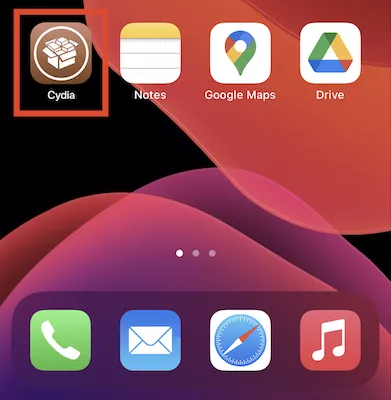
If you've jailbroken your device, it's probably because you wanted to install an app from elsewhere other than the official App Store, right?
While we get the rationale, just know that if you have a jailbroken iPhone, the chances are higher that you might have unwittingly invited a piece of malicious software, called a worm, into your device at one time or another.
The presence of a worm is significantly more likely if you're witnessing odd behavior on your iPhone, such as apps redirecting you to dodgy-looking web pages. If this happens and you suspect a virus is present, then you need to follow these steps:
- Delete all suspicious apps. If you think a recently downloaded app is causing the issue, try uninstalling it to see if this helps.
- Restore from an earlier, safe backup. Or, if all else fails, restore to the factory settings.
If you need a more detailed walkthrough of how to locate and remove viruses on your iPhone, check out our earlier post: How to Get Rid of Viruses on Your iPhone or iPad.
2. You're seeing apps you don't recognize

Have you seen an app that for the life of you, you can't remember installing? This is one big red flag.
3. You're being inundated with pop-ups
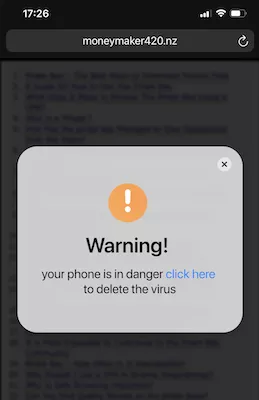
Ads have a habit of following us all over the internet, courtesy of third-party cookies (unless you use a VPN on iOS, of course). However, if you're seeing too many invasive pop-ups, this could be a sign malware has infected your iPhone.
4. A spike in cellular data usage
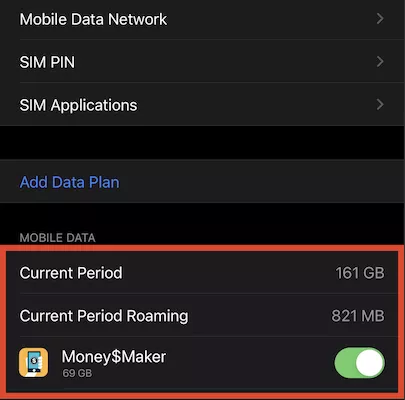
Worried you have malicious software on your iPhone? Look out for a sudden rise in your cellular data usage that cannot be explained by your regular iPhone use. And if nothing else, keeping a close eye on your data usage is just plain common sense.
5. Your iPhone is overheating
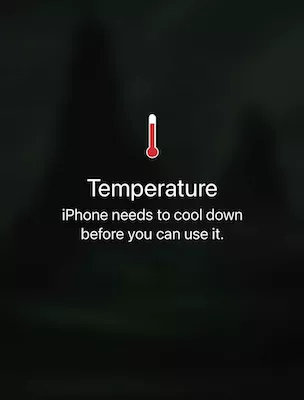
Again, lots of things could cause your iPhone to overheat (a faulty battery is usually the culprit) But, in rare cases, it could indeed be a sign of a virus.
6. The battery is draining faster
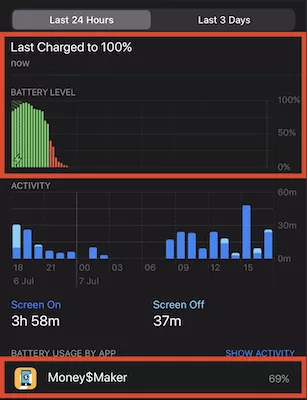
Irregular battery drainage can be caused by power-hungry apps or wear and tear due to age. That said, there is a chance, however slim, that a piece of malware is working in the background without your knowledge.
If you experience any of the above issues, or other strange behavior, then it's high time you look into cybersecurity protection for your Apple devices.
How to get rid of fake virus scams on your iPhone
First off, if you're seeing pop-up warnings recommending fake updates or bogus software to remove viruses or malware on your iPhone, do not take the bait. This is likely a phishing attempt. Don't even exit the page – this is likely set up to steer you further into their trap.
Instead, do the following:
1. Close down the Safari tab where the pop-up appeared.
2. Open up your iPhone Settings.
3. Put your iPhone on Airplane Mode. (This will stop any malicious apps from receiving and sending data via your network.)
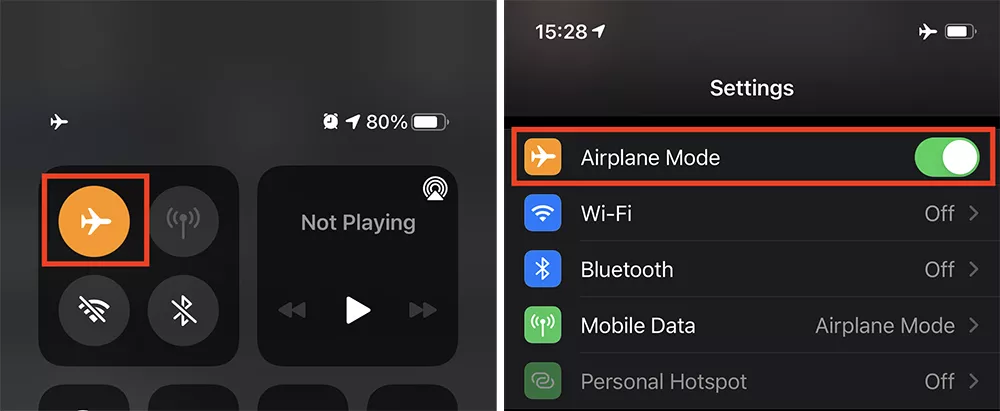
4. Next, tap on Safari > Clear History and Website Data.
5. Finally, make sure Block Pop-ups and Fraudulent Website Warning are both enabled.
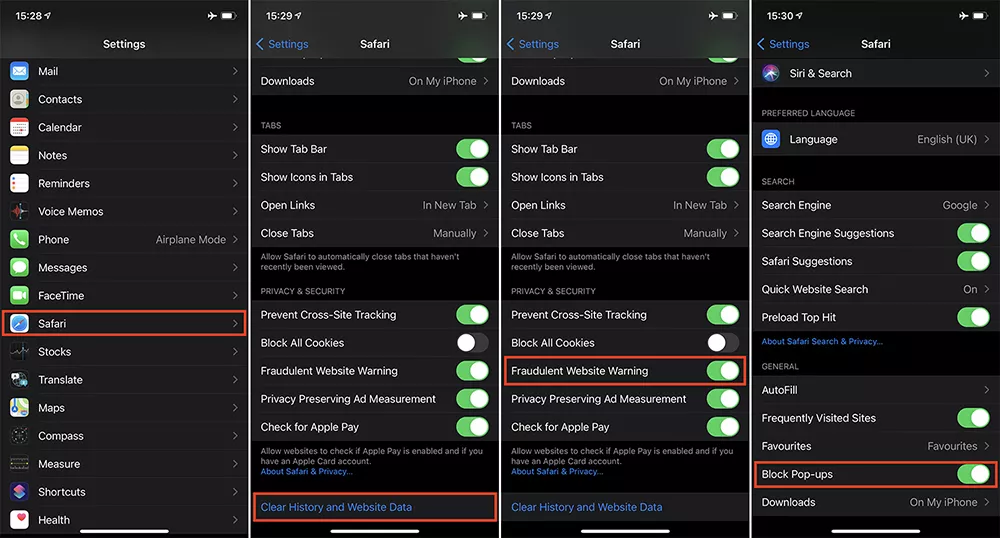
At this point, you should be fine to turn off Airplane Mode, then return to browsing safely as normal. Phew!
How to protect your iPhone from future viruses or malware and data leaks
Luckily, protecting your iPhone from viruses is a fairly straightforward business. Our top tips include:
- Avoid public Wi-Fi. Cybercriminals regularly explore public Wi-Fi vulnerabilities to steal information and distribute malware. Avoid public Wi-Fi altogether or, at least, protect your iPhone with a security app before accessing a free hotspot.
- Only install apps from the App Store. And while we're at it, please don't jailbreak your iPhone. Not only does this void your warranty, but any apps you download outside of the App Store are exponentially more likely to put you in harm's way.
- Restrict your app permissions. Even if you don't end up making any changes, it's still worth being vigilant about the level of permission you're giving over to any apps on your device, especially if they want to access data irrelevant to their functions.
- Update your iPhone regularly. This can be done in the background while you're getting some zeds, so there's no excuse for procrastinating! This simple step will help iPhone users avoid the vast majority of threats.
- Use an iPhone security app. Install Clario for more secure internet experience. The app comes with a VPN for guarding your privacy, ad-blocker with anti-tracking feature for clean browsing, 24/7 breach monitoring and expert support.
Clario protects your Apple devices against malicious websites and other threats to your online security and privacy. You can find out more on our cybersecurity software page and stay updated on all the latest cybersecurity trends and topics by subscribing to our blog.
Read more:
- Can Macs Get Viruses?
- How to Get Rid of a Virus from Your Computer
- How to Secure your iPhone from Hackers
How To Check Phone For Virus Iphone
Source: https://clario.co/blog/how-to-check-iphone-for-virus/
Posted by: nguyenbahe1939.blogspot.com

0 Response to "How To Check Phone For Virus Iphone"
Post a Comment